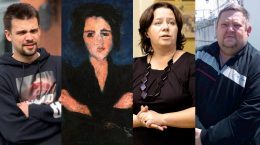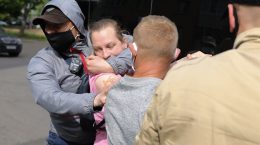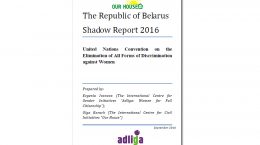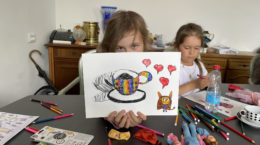The Analytical report has been drawn on the basis of the results of the questionnaire survey held by the International Centre for Civil Initiatives “Our House” within the framework of the project of humanitarian assistance to Belarusian women refugees in Poland.
- For the period from November, 2021 to January, 2022 the International Centre for Civil Initiatives “Our House” provided food assistance to 70 mothers and 115 children. During the same period 3 tons of humanitarian supplies that had been provided to the International Centre for civil initiatives “Our House” by German partners (International Society for Human Rights, German Section) were delivered to Warsaw and sent to Poland in November, December and January.
In 2021 the Polish Office for Foreigners issued decisions in relation to 4.7 thousand people, that included basically Belarusians (1150 applications). The international protection implies complete concealment of personal data of applicants; therefore, we cannot indicate how many women were among them. Also, it should be kept in mind, that usually one family member files an application for the whole family, so to the number 1150 of Belarusians granted with international protection in 2021 in Poland, an average of 2 to 4 persons can be added (wife/husband and children). Therefore, it can be assumed, that as minimum as 1150 women, including girls, either have applied for international protection themselves or are in Poland as family members of such applicants.
According to the date of the Office for Foreigners of the Republic of Poland, Belarusians constitute the most numerous group of foreigners who applied for international protection in Poland in 2021. The total number of applications was 7700. According to the data provided by the Office for Foreigners, 2256 applications were filed by Belarusians. As it was mentioned before, one family member files an application for the whole family. Food assistance was provided to women refugees who applied for international protection in 2021, that is, they are included in the number 2256. In accordance with the information, received by “Our House”, as well as the data provided by the Office for Foreigners of the Republic of Poland, we can approximately estimate the percentage of people that we provided assistance to:
| Total number of applications for IP | Number of Belarusians applied for IP | Number of people provided with food assistance | Percentage of people applied for IP in Poland and provided with food assistance |
| 7700 | 2256 | 70 | 3.1% |
Thus, according to the calculations, at this moment only 3.1% of people who had applied for international protection were provided with food assistance. Of course, there are several different organizations where Belarusians can get help. However, according to the survey conducted among women and judging from personal communication of the volunteers of “Our House” with the refugees, a lot of Belarusian women find themselves in difficult financial and psychological situation during the very first months upon their departure from Belarus, and real financial and material assistance is provided by an extremely limited number of organizations. That is, the help that is given now is clearly not enough. A great number of women that have been bound to urgently leave Belarus remain practically with no means of survival, they do not know the language so they cannot find a good job for a long time until they learn it, they have to spend a great amount of time on placing their children to educational institutions (according to Polish legislation, every child up to the age of 18 and including, living on the territory of Poland, is obliged to get education) and also on applying for international protection and on all the procedures related thereto. Due to their urgent departure, a lot of women did not manage to take enough things, personal and household items with them to ensure a normal existence even for their children. Often, they do not have any means to buy medicines and the minimum number of hygiene products. The food assistance provided by the International Centre for civil initiatives “Our House” for less than three months has covered just a small percentage of needs of women and children from Belarus relocated to Poland.
At the same time, often there are certain conditions that should be fulfilled in order to receive any kind assistance, like providing evidence of serious repressions, namely, a launched criminal case. However, the situation in Belarus with law, human rights and especially women rights is extremely complicated, and that should be taken into consideration. For their civic stance women often get under serious pressure including threats, psychological and often physical violence. One of the threats used quite frequently against women is removal of children from the family.
Women make a decision to urgently leave the country practically right after the pressure on them starts growing, and especially when the threats against their children arrive.
All that causes a number of problems when later, during the adaptation period in a foreign country, such woman applies for help to various organizations and foundations: quite often a woman does not have any documentary evidence of repressions or pressure against her.
That is, the repressions exist, but the documents confirming them do not. It is connected with the following:
- Belarusian enforcement bodies execute a great number of actions, like home searches, preventive conversations, interrogations, without the due documentational support of the process, therefore, a lot of women just do not have any documentary evidence of their experience. According to the current legislation of the Republic of Belarus, a 72-hour-detention may be conducted without presenting a charge. So, Belarusian enforcement bodies make a wide use of that possibility: they detain a woman for 72 hours and exhort enormous pressure on her: hours-long interrogations, cells with no mattresses, bed linen, not even with minimal hygiene products. Often women are placed in the same cell with asocial individuals suffering from contagious diseases, like lice, scabies, COVID-19. Upon expiration of 72 hour the woman may be released without charge and without any issued document confirming the detention and procedural acts in relation to her.
- Having experienced such abuse and torture, women, even those after 15 days of administrative arrest, get a huge psychological trauma, so when they receive no documents confirming their administrative arrest, they are too terrified to go and demand them. They have panic attacks and other uncontrolled conditions just at one thought about that.
- Experience has shown that even when a woman is invited to a law-enforcement institution as a witness, which looks innocent, does not mean that the woman will be let free after the interrogation: the change of the status from a “witness” to the “suspect” can take place in a second while the woman is still at the institution. Thus, being invited to participate as a witness, a woman may get arrested right during the interrogation. Such cases are so numerous that it is understandable why women avoid going to interrogations and why they escape with their children without waiting for the result of the investigation.
The verification of Belarusian women refugees in Poland that need help and support could be made by human rights organizations and foundations on the basis of the fact of acceptance of their application for international protection and issue of a temporary foreigner ID (TZTC) – a document confirming the identity of the person and proving that the application has been accepted. Every person in the process of filing the application must undergo an interview (interrogation) at the Office for Foreigners; one of the aims of such interview is to establish whether the person really is in danger and in need of international protection. Therefore, acceptance of the application could be considered a valid criterion for verification.
- The most unprotected category is exactly women with kids that had to run without a male family member. It should be mentioned that among those we have provided the food assistance to, were 44 single women and 14 mothers of many children.
According to the preliminary survey, 25 children among the 115 have been diagnosed with serious medical conditions, including 5 children with autism, two children who have had urgent surgeries, and 2 children who are insulin-dependent diabetics.
- The International Centre for Civil Initiatives “Our House” turned to the Belarusian community in Poland in order to unite people to solve issues of filing for disability status and other medical problems. According to the interview of 15 women from the community, 2 children are sick on infantile cerebral paralysis, 4 have been diagnosed with autism, 3 children are visually impaired, 2 kids move in a wheelchair, 2 children are diagnosed with psycho-neurological condition, and 2 children have injuries and need medical rehabilitation.
Before leaving Belarus, women were subject to violence, pressure, repression, that mainly included the following:
- house searches, mainly at night and with the use of brutal physical force
- “invitations” to prophylactic conversations to the enforcement bodies and bodies of guardianship accompanied by extreme psychological pressure and threats
- arrests and detention in pre-trial detention facilities.
- beating and torture, threats of violence
- threats of removal children or actual removal and kidnapping of children
- loss of job, dismissal
- threats to cause trouble to relatives: as a rule, children, husbands or parents, pressure on the relatives
- threats of rape by police operatives
- harassment, also on social media, attempts of incitement to suicide
- forceful deportation, expulsion (for ethnical and political reasons, among the ethnical reasons the Polish minority in Belarus should be indicated)
- illegal forceful access to telephones, obtaining personal data by KGB and police operatives and blackmailing women with the help of such data
- recruitment of the active women by KGB operatives by enforcement to collaborate and intimidation
- sleep and food deprivation
- threats to place women to psychiatric wards and actual placement to psychiatric wards (punitive psychiatry).
Women are sentenced, charged, appear as suspects or witnesses mainly under the following articles of the Criminal Code of the Republic of Belarus (some women are in different statuses under 2, 3 and more articles):
| Article number | Article | Number of women |
| 130 | Incitement to racial, national, religious or other hatred or discord | 1 |
| 188 | Libel | 1 |
| 209 | Fraud | 1 |
| 269 | Destruction of soil | 1 |
| 289 | Terrorist act | 1 |
| 290-2 | Support of terrorist activity | 1 |
| 290-5 | Organization of activity of a terrorist organization and involvement into such activity. | 1 |
| 292 | Takeover of buildings and structures | 2 |
| 293 | Mass riots | 7 |
| 339 | Hooliganism | 2 |
| 341 | Desecration of buildings and damage of property | 1 |
| 342 | Organization and preparation of actions that seriously harming social stability, or active participation in them | 16 |
| 356 | High Treason | 1 |
| 357 | Conspiracy and other actions performed with the aim to seize or retain state power | 1 |
| 361-1 | Formation of extremist groups or active participation in such | 6 |
| 361-2 | Financing of extremist activity | 2 |
| 367 | Libel against the president of the Republic of Belarus | 1 |
| 368 | Insult to the president of the Republic of Belarus | 1 |
| 369 | Insult of a government official | 2 |
| 382 | Unauthorized appropriation of the title or the authority of an official | 1 |
It should be admitted, that although these articles of the Criminal Code sound ominous, in practice the actions performed were, as a rule, posts in Telegram channels, usage of white-red-white symbols, or participation in peaceful protest actions.
According to the preliminary analysis made by the International Centre for Civil Initiatives “Our House”, the women refugees mostly need:
- food assistance (one time or multiple, depending on their financial situation)
- legal assistance, help with documents and paperwork
- psychological help
- medical help and medical support, including medication, for conditions that include, but are not limited to, depression, suicidal thoughts, anxiety and other disorders obtained in the consequence of the experienced repressions and torture
- assistance with social housing
- assistance with adapting children in educational institutions
- help with learning a foreign language
- social adaptation and work with psychological problems, restoration of communication skills
- help with organization of support and solidarity groups, strengthening women communities of Belarusian diaspora for mutual support.
Providing help and support to women refugees from Belarus during the period of their adaptation is the factor necessary to bring them back to normal life and social activity. A lot of women continue their struggle with the dictator regime for their rights and freedoms, even if they have to do it on the territory of another country. However, it’s important for them to contribute to the common cause so that the democracy in Belarus wins and the rule of law is restored. However, being in a difficult economic and psychological condition, loneliness and lack of social adaptation, they fall out of the Belarusian civil society, leave the civic activity, which leads to further isolation and aggravates their psychological condition, and also demoralizes them and prevents from returning to the protest activity, that united all Belarusians in 2020.







